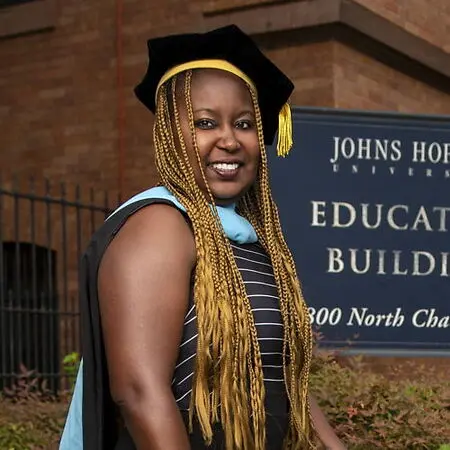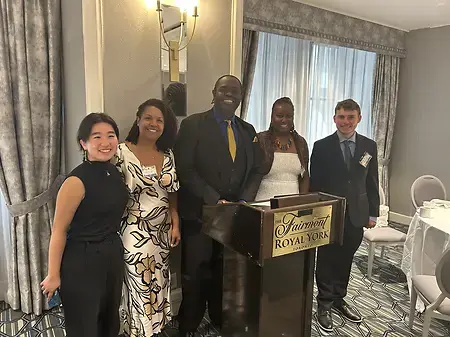Dr. Shelina Warren, Ed.D, NBCT

Dr. Shelina M. Warren, Ed.D, NBCT, is a nationally recognized educator, scholar-practitioner, and U.S. Army veteran with over two decades of experience in public education. Based in Washington, D.C., she serves as the Director of the Eleanor Holmes Norton Law & Public Policy Academy at Dunbar High School, where she designs experiential learning programs that connect students to real-world opportunities in law, civic leadership, and public service. As a National Board Certified Teacher and Tillman Scholar, Dr. Warren is deeply committed to cultivating democratic classrooms that empower students and elevate their voices in meaningful ways.
A recent graduate of Johns Hopkins University’s Ed.D. program in Urban Leadership, Dr. Warren’s research focuses on creating inclusive, student-centered environments that validate and empower learners through transformative teacher development. She has collaborated nationally with leading civic education organizations including iCivics, Street Law, Mikva Challenge, and the National Council for the Social Studies. Her curriculum innovations, mock trial programs, and leadership in teacher coaching have positioned her as a driving force in justice-oriented education.
Dr. Warren’s impact extends beyond the classroom—she is a frequent national presenter, op-ed contributor, and advocate for civic equity. Her leadership style blends academic rigor with authenticity, empathy, and a tireless dedication to student success. Passionate about partnerships, she actively seeks consulting opportunities with schools, universities, and civic organizations focused on curriculum development, teacher training, and youth engagement. Her work is rooted in the belief that every student deserves a seat at the table—and the tools to lead it.
• Doctor of Education
• The John Hopkins University
• 2025 American Lawyer Alliance Teacher of the Year
• 2025 Innovative Civic Education Award
• 2022 American Civic Education Teacher
• 2021 DC Teacher of the Year - Second Runner Up
• 2020 Anna Julia Cooper Social Justice Award
• 2015 John Morton Excellence in Teaching Economics Award
• 2012 Arkansas Teacher of the Year Finalist
• Kappa Delta Pi
• Zeta Phi Beta
• Inc.voya unsung hero- awards
• Care packages to the volunteer.know your rights.always knew she wanted to be a teacher-
What do you attribute your success to?
My success comes from three anchors: the discipline and grit I learned as an Army veteran, a scholar-teacher mindset that treats every classroom as a lab for justice, and deep community partnerships that open real-world doors for students. I lead with “Educate. Validate. Empower.” and stay focused on impact—building programs, securing resources, and centering student voice so Dunbar scholars see themselves as advocates, not just learners.
What’s the best career advice you’ve ever received?
A mentor told me, ‘Make your calendar reflect your values, not your inbox.’ It changed everything. I stopped chasing every fire and started building routines that compound: daily prep, reflection, and partnership time. When I align time with values—students first, community second, paperwork third—the work scales. Grants get written because I block time. Students are empowered because I plan for their voice. Doors open because I nurture relationships before I need them. That single shift—from reacting to designing—has been the engine of my career.
What advice would you give to young women entering your industry?
To young women entering education/civic leadership: build credibility fast—show up prepared, ask great questions, and deliver. Find two mentors and one sponsor. Document your wins. Learn budgets and grants early. Protect your time and voice: set boundaries, say no clearly, and negotiate pay, title, and support like a pro.
What are the biggest challenges or opportunities in your field right now?
Attention & AI overload → Authentic learning
Move: Use AI to accelerate prep (rubrics, stems, case packets) so class time shifts to debates, simulations, and field studies.
Polarization in civics → Skills for productive disagreement
Move: Normalize discourse routines (roles, evidence rules, “claim–evidence–reasoning”) and measure growth, not just opinions.
Shrinking field trips & budgets → Community-as-classroom
Move: Bring courts, firms, and advocates in; run on micro-grants and partner hours. Publish a one-pager for partners to plug in.
Teacher burnout → Team-based design
Move: Co-plan once, reuse often. Build a shareable library (lessons, permission slips, contact lists) and rotate facilitation.
What values are most important to you in your work and personal life?
Purpose & service. Every decision answers, “Does this expand students’ power?”
Behavior: Protect time for planning, partnerships, and student voice.
Integrity. Do the right thing, even when it’s inconvenient.
Behavior: Transparent rubrics, clear communication, follow-through.
Equity & dignity. People first; outcomes that close gaps, not widen them.
Behavior: Design for access (stipends, flexible deadlines, multiple ways to show learning).
Learning out loud. Reflect, iterate, share.
Behavior: Debriefs after events, publish resources, invite feedback.
Excellence with empathy. High expectations + human pace.
Behavior: “Warm demander” stance; scaffold rigor without shame.
Collaboration. Power grows when we share it.
Behavior: Build and tend partnerships; credit others publicly.
Stewardship. Money and time are mission fuel.
Behavior: Write grants, track impact, spend where students feel it.
